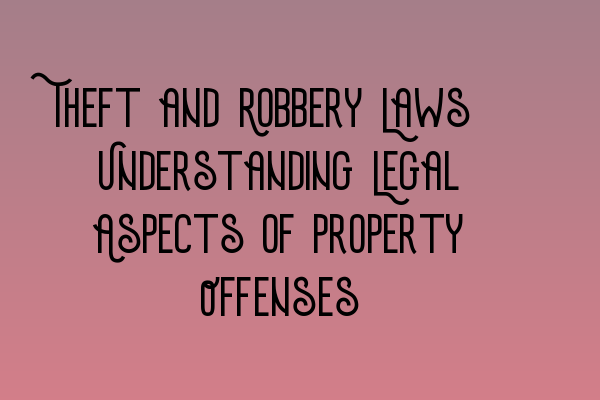Theft and Robbery Laws: Understanding Legal Aspects of Property Offenses
When it comes to property offenses, theft and robbery laws play a crucial role in maintaining law and order in society. Understanding the legal aspects of these offenses is important for both individuals and legal professionals involved in criminal law cases. In this article, we will explore the key elements of theft and robbery laws, covering definitions, penalties, and related legal procedures.
Theft Laws
Theft is the act of dishonestly taking someone else’s property without their permission, with the intention of permanently depriving them of it. It can involve various forms, such as shoplifting, pickpocketing, or fraud. Under UK law, theft is punishable by both fines and imprisonment, depending on the severity of the offense.
When dealing with theft cases, it is crucial to establish the necessary elements to prove the crime. These elements typically include:
- Dishonestly taking property
- Belonging to someone else
- Without their consent
- With the intent to permanently deprive them of it
Prosecutors must gather evidence and present a strong case in order to secure a conviction. For legal professionals preparing for the SQE 1 Practice Mocks FLK1 FLK2 or seeking SQE 2 preparation courses, understanding the intricacies of theft laws is essential.
Robbery Laws
Robbery takes theft to a more serious level by involving the use or threat of force. It is the act of taking someone’s property directly from their person, or in their presence, with the intention of causing them injury or putting them in fear. Robbery is a grave offense and carries severe penalties.
To establish a case of robbery, the prosecution must establish the following elements:
- Theft of property
- From a person or presence of the victim
- Use or threat of force
- With the intent to cause injury or fear
Robbery laws are designed to protect individuals from violent crimes and ensure their safety. Legal professionals who are knowledgeable about robbery laws are better equipped to represent their clients effectively in court and argue for appropriate penalties.
SRA SQE Exam Dates
For aspiring legal professionals, staying updated on the SRA SQE exam dates is crucial. The SQE exams assess the competence and skills required to practice law effectively. Understanding theft and robbery laws is essential for successfully passing these exams.
Whether you are a law student preparing for the SQE exams or a legal professional seeking to expand your knowledge, gaining a thorough understanding of theft and robbery laws is essential. Choosing the right SQE 1 preparation courses and SQE 2 preparation courses is a great step towards acquiring the necessary expertise.
In conclusion, theft and robbery laws are integral to property offenses and have significant implications for both individuals and legal professionals. By understanding the key elements, penalties, and legal procedures, one can navigate the complexities of criminal law and ensure justice is served. Whether you are preparing for SQE exams or dealing with a criminal law case, consulting with a qualified solicitor who specializes in criminal law and practice is highly recommended.
